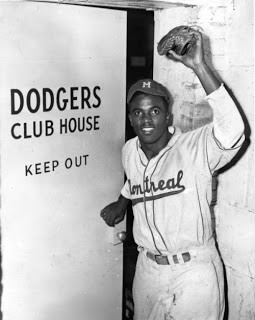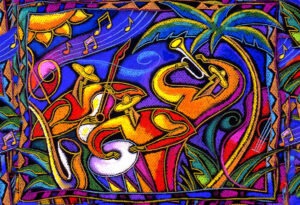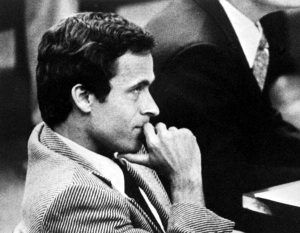"I think I can play in the big leagues. All I am asking for is the opportunity. If I fail, I'll step aside and try to so something else." - Jackie Robinson1Jackie Robinson, a man of courage, determination, and record-breaking events, was born on January 31, 1919, to a single mother who raised him along with four other siblings. This little boy grew up to change the views and opinions of African-Americans playing baseball in the Major Leagues. Jackie Robinson became the figure that would embody African-Americans competing in “a white-man’s game” and broke through that barrier of racism. Through the years growing up, Jackie competed against his older brother, Matthew Robinson, in whatever game they were playing. His older brother competed in the 1936 Berlin Olympics in the 200-meter dash, winning a silver medal just behind Jesse Owens. Matthew was the person who inspired Jackie to pursue his talents and to dream big. That is exactly what younger brother Jackie Robinson did, despite the racial controversy that lay ahead.

Jackie Robinson attended UCLA and became the first student athlete to win varsity letters in all four sports: baseball, basketball, football, and track. Unfortunately, in early 1941, just shy of graduation, Robinson left college “convinced that a college degree would not help a black man get a job during the Great Depression.”2 In the fall of 1941, Jackie moved to Honolulu, Hawaii to play football for a Semi-Professional team called the Honolulu Bears. Sadly, Robinson’s season was cut short due to his enlistment into the Army for World War II. He served in the Army from 1942 to 1944, ranking as high as 2nd Lieutenant. After being honorably discharged from the Army, Jackie Robinson’s life changed the world forever through the sport that he least excelled in, baseball.

The baseball world dealt with its own segregation views. “Segregated baseball showed the great injustice of Jim Crow, yet the Negro Leagues (the generic name for the organized black major leagues from 1920 through the 1940’s) also provided opportunities for black players, executives, and towns to thrive in unequal United States.”3 Jim Crow laws were laws that segregated facilities into white and African-American, and were common throughout the South. The game of baseball in the South only allowed White participants, players, and fans. African-American players, fans, and owners were denied and treated unjustly because of the color of their skin. “Tradition, based on deep-seated racial views of African Americans as inferior in sport, indeed, in all aspects of life, turned out to be the biggest barrier to integration.”4 Jackie Robinson broke these barriers with the help of a man named Branch Ricky.
In 1943, Branch Ricky was the president and general manager of the Brooklyn Dodgers. Ricky believed in Jackie Robinson and knew how talented he was. He wanted Robinson to be out there on the field with other Major League Baseball players, where he belonged, with the best. Branch Ricky was determined to erase the color line in baseball, and he knew Jackie Robinson would be the perfect candidate for this goal. “At the historic interview of August 28, 1945, Robinson expected to be signed to a Brown Dodgers contract but Ricky soon showed his cards. He wanted Robinson to sign with the white Dodgers and become the man who would erase the national pastime’s color line.”5 The famous dialog between Branch Ricky and Jackie Robinson started with Robinson asking Ricky a question that foreshadowed the type of player he would be in the years to come: “‘Mr. Rickey,’ asked Robinson, “do you want a ballplayer who’s not afraid to fight back?’ No, Replied the Dodgers’ president, ‘I want a ballplayer with guts enough not to fight back.’”6

A few months later, in February 1946, Robinson and his newlywed wife, Rachel Isum, his college sweetheart, traveled to Daytona Beach, Florida for the Royal’s spring training camp. “Staring down Jim Crow at Daytona Beach’s City Island Ball Park on March 17, 1946, in an exhibition between the Royals and their big league affiliate, the Dodgers, Robinson became the first black player since Moses Fleetwood Walker in 1888 to take the field against a major league team.”7 Although Robinson was known for being great at baseball, he had a slow start. During camp, when Jackie Robinson did not compete at the standard being set for him, commentators began to question his credentials and accused him of having special privileges. Without being discouraged, Robinson played the game he loved with respect and humility.
Despite how poorly Jackie Robinson was treated because of the color of his skin, he did not let other people’s opinions factor into his mindset. Teams did not want to play the Montreal Royals, because they had an African-American in the line-up. Players also tried to hurt Robinson when he was playing on the field. “In Buffalo, New York, Bison’s players spiked him as they slid into second base, knocking him out of the lineup for three weeks.”8 On April 15, 1947, playing the Boston Braves, Jackie Robinson became the first African-American to play in an official major league baseball game. The Dodgers would go on to win the National League pennant, and Jackie Robinson was named Rookie of the Year in the Major Leagues.

In the next two years, baseball began to slowly integrate; the pressure on Robinson began to ease up. Jackie Robinson went on to be known as one of the greatest baseball players of all time. He remained steadfast in his pursuit for justice and civil rights. He wrote letters to Presidents Harry S. Truman, Dwight D. Eisenhower, John F. Kennedy, and Lyndon B. Johnson thanking them for their support of civil rights. On October 24, 1972, Jackie Robinson died of a heart attack, at the age of fifty-three. His jersey number 42 was retired in 1997. In 2004, Major League Baseball proclaimed April 15th annual Jackie Robinson Day, where the players began to wear the number 42 in his honor. The tradition continues to this day.
- Thomas W. Zeiler, Jackie Robinson and Race in America: A brief history with Documents (Boston: Bedford/St. Martin’s, 2014), 80. ↵
- Thomas W. Zeiler, Jackie Robinson and Race in America: A brief history with Documents (Boston: Bedford/St. Martin’s, 2014), 3. ↵
- Thomas W. Zeiler, Jackie Robinson and Race in America: A brief history with Documents (Boston: Bedford/St. Martin’s, 2014), 6. ↵
- Thomas W. Zeiler, Jackie Robinson and Race in America: A brief history with Documents (Boston: Bedford/St. Martin’s, 2014), 9. ↵
- Thomas W. Zeiler, Jackie Robinson and Race in America: A brief history with Documents (Boston: Bedford/St. Martin’s, 2014), 17. ↵
- Thomas W. Zeiler, Jackie Robinson and Race in America: A brief history with Documents (Boston: Bedford/St. Martin’s, 2014), 17. ↵
- Thomas W. Zeiler, Jackie Robinson and Race in America: A brief history with Documents (Boston: Bedford/St. Martin’s, 2014), 20. ↵
- Thomas W. Zeiler, Jackie Robinson and Race in America: A brief history with Documents (Boston: Bedford/St. Martin’s, 2014), 21. ↵



87 comments
Vania Gonzalez
Jackie Robinson is probably one of the greatest figures in civil rights movements because he changed the way we play our sports in some way. He went through so much while in his first year playing major league baseball that could have made anyone give up and stop playing the game but his belief and love for that game kept him going and now we have all kinds of races in every sport playing together.
Charli Delmonico
I loved this article! The 42 movie is one of my favorite movies of all time, but this article shed some light on a few facts that I didn’t know before. I was’t aware that Jackie had many siblings and an older brother who was also an outstanding athlete. I love how Jackie was able to overcome so much adversity while being weighed down by fierce pressure to be the best that he can be every day. He is truly an admirable person with a story that inspires everyone.
Alexander Avina
A truly motivational story of persistence and will. Jackie Robinson is a true inspiration to anyone who has the fortune of hearing about his incredible story. I thought that this paper was written very orderly and included all the important information about this powerful sports figure. I enjoyed reading about his amazing story of athletic achievement at the highest level. Thank you for making this article enjoyable and interesting to read. Overall, this was a soundly put together article, on an inspiring figure.
Amariz Puerta
This article was very well written and you can tell that the author put an ample amount of time into it. I really enjoyed reading this article it really showcased the time period of this because at the time the colored and the white had lots of tension. Jackie Robinson is such an inspiration and a brave person to overcome these obstacles.
Bianca-Rhae Jacquez
It only takes one brave person to change the entire world. During the 1940s no one would’ve ever thought that there would be an African American baseball player. Jackie Robinson didn’t let the color of his skin stop him from playing the sport that he loved so much. He redefined the typical baseball player and redefined the worlds views. The movie 42 that was based on his life was truly amazing. I think everyone should know how Jackie Robinson is.
Cameron Lopez
It was nearly impossible to become a professional baseball player as an African American in the 1940’s. But Jackie Robinson never gave up his will to make it and it was such an amazing story on how he actually achieve as a baseball player considering all the racial slurs and hate he received in the process. The movie over him (42) was such a good movie and it really showed what happened to him and how much he went through just to become a professional baseball player.
Noah Wesolowski
At the time becoming a professional player and an African American was insane the amount of tension between the whites and the blacks at that time was very high. Blacks were seen and inferior and society tried to separate them from whites at every chance they could get. Jackie Robinson must have been a very strong and courageous person at that time to withstand all the hate and racism that was thrown his way.
Samantha Ruvalcaba
I’ve always admired Jackie Robinson’s resilience and determination. I was surprised by your mention of him not excelling in baseball at first–of all sports. That was something I didn’t know, and it puts things into further perspective. Despite being harassed and yelled at during games, Robinson ignored the racist remarks and remained unfazed by them, something I’ve always admired about his character.
Matthew Swaykus
This was a very well-written article about a legendary figure in baseball history. The Jackie Robertson Story may well have been the mark of true change within this country. It was his dedication to doing what he loved no matter how much hatred, pain, and flagrant disrespect he would come across that is so inspiring. It was a heavy weight to carry, certainly, but Jackie ran with it and played just as good if not better than the other major league players.
Cameron Lopez
I’ve always known about Jackie Robinson and him making history of being the first African American to play baseball with white people. I then saw the movie “42” and it made me more interested in learning more about him. I like all of the information that was presented in this article and how it was written. The title worked well as well, knowing it was a white mans game. Its sad that he died at such a young age of 53, he made literal history being the first African American baseball player to play with all white men. He will always be a Legend in the game of baseball and making history that changed the way the game was played.